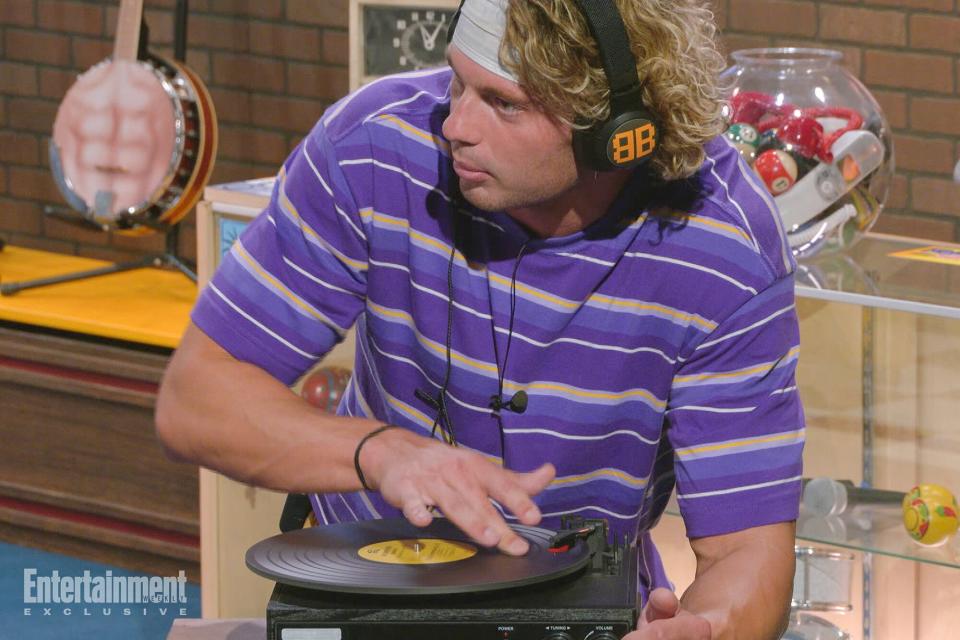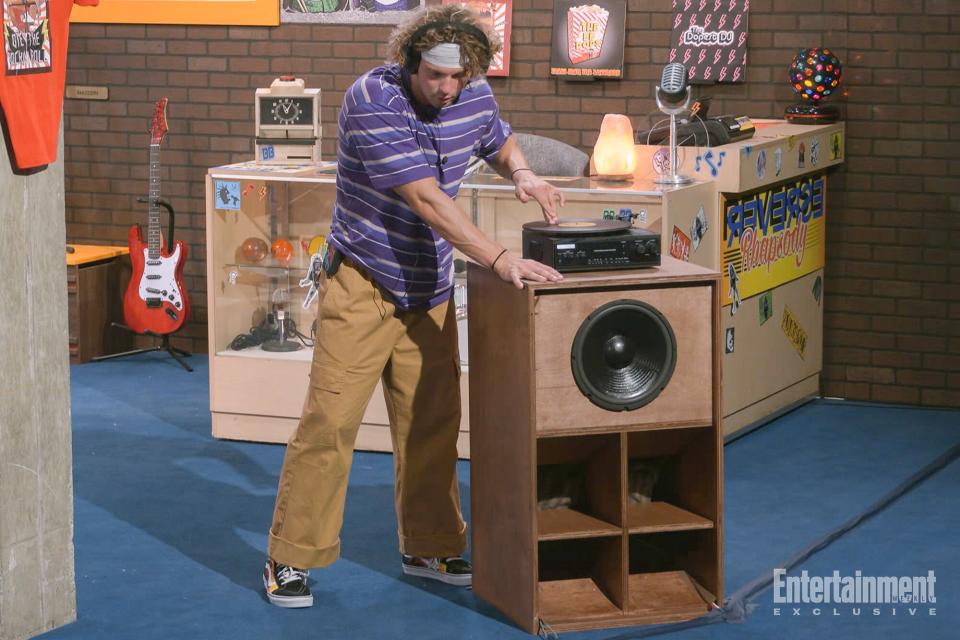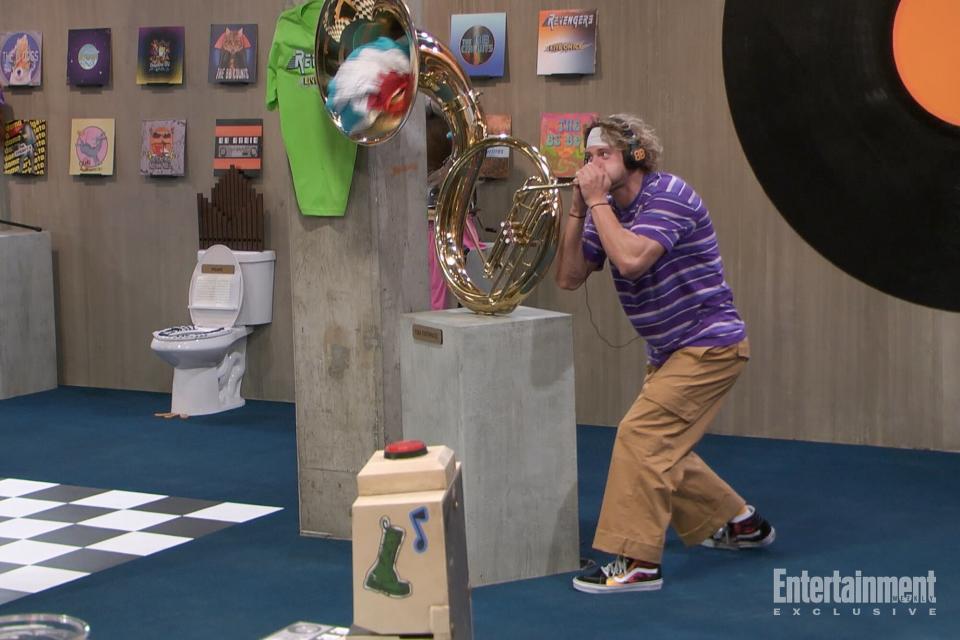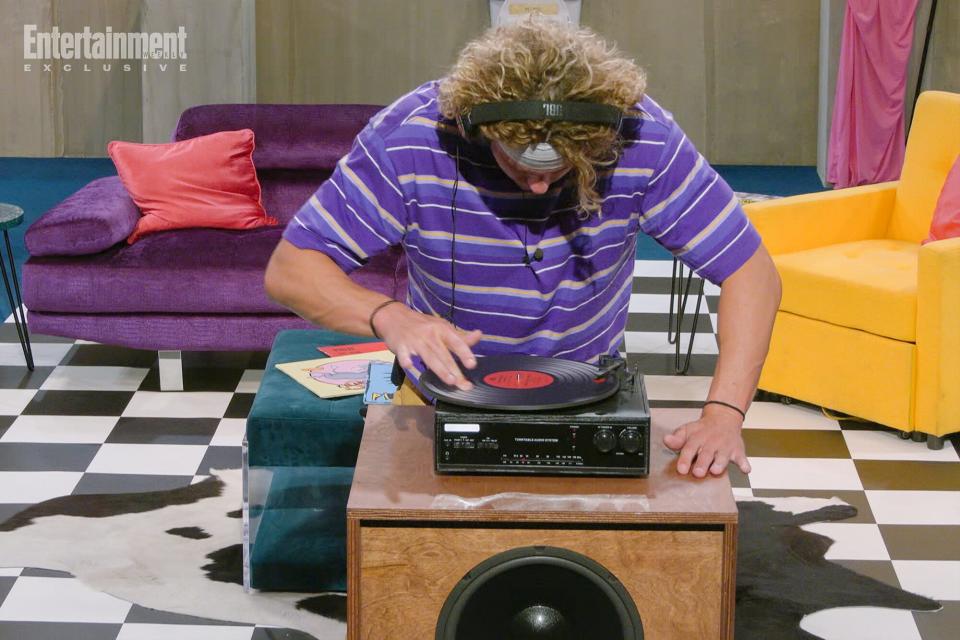How Big Brother made the game accessible for deaf contestant Matt Klotz
- Oops!Something went wrong.Please try again later.
Big Brother season 25 has already been filled with big twists and turns. A "Time Laser" was set off. Survivor legend Cirie Fields entered the game. And just the other night, contestants were attacked by something called a "Nether Gorgan." (I promise, all of that actually happened.) But the biggest change to both the house and to the game this season has revolved around the addition of Big Brother's first ever deaf houseguest, Matt Klotz.
Klotz had already proven himself to be a fierce competitor, representing the United States as a world record holding swimmer at the Deaflympics. But having a deaf contestant enter the house meant that Big Brother producers had to reevaluate how to best accommodate the player for interactions in both the Diary Room and during competitions — and those accommodations will be put to the test tonight in a Veto competition called Twisted Tasks that is based heavily around audio clues.

CBS Matt Klotz on 'Big Brother' season 25
The preparation for Matt's arrival started before the contestants even moved to the house. "We met Matt in the casting process and loved him," says executive producer Allison Grodner. "He's an accomplished athlete and wanted to do this because he loves the game and the show, but also to set an example and to inform people about what he goes through and be an example for people out there to learn about people who are hard of hearing and deaf. So we were thrilled to take that on."
Taking that on meant taking a long hard look at the way producers normally interact with contestants. "It's an incredibly complex system that we have here that involves a lot of audio and a lot of people behind the scenes talking to people in the house, talking to people in the Diary Room, talking to people in the yard," says Grodner. "And so we had to figure out how we were going do that with Matt."
The first step was testing out some new audio equipment. Matt was actually blindfolded and taken into the house before the game began to test out the tech. He was whisked into the backyard to test out the speaker placement and levels and also brought into the Diary Room where all his interview confessionals would take place.
The Diary Room was extra tricky because unlike with his interactions with the other contestants, Matt could not simply read lips since producers are heard but not seen. Nor could producers just turn the volume way up for Matt's hearing aids to pick up. "The Diary Room is a place where you tell your inner secrets, right?" says Big Brother's chief engineer David Crivelli, who has been with the show since season 1 and coordinated all the audio technology for Matt. "So we need to make sure that no sound leaves the Diary Room and goes out to the living room because we have turned the amplifier speaker up to where Matt can hear better a producer asking him a question. Then we are doing a disservice to Matt because we're releasing secrets to the houseguests."

CBS Matt Klotz on 'Big Brother' season 25
The solution involved sealing up all the spaces between doorways where sound could escape, while also adding a new ultrasound speaker directly over Matt's head. That way, while the overall volume would not be increased dramatically, it would "deliver ultrasound in a very, very specific narrow beam," explains Crivelli. "And by modulating the audio on to the ultrasound, you create waves of sound that are very directional."
Not only that, but Matt tested out seven different voices asking him questions to find the one that sounded the best. "We had our show doctor get in touch with his specific audiologist because every person is different in how they hear," says Grodner. "And so we needed to know specifically what levels he was able to function with and what would be best for him. It turned out that some of the lower baritone voices were easier for him to hear."
Getting the right voice and speaker was just one part of the solution, however. Those fixes would work hand-in-hand with the producers' other big tool, which was a new voice-to-text system. While Matt has a monitor in the Diary Room where questions and instructions appear written out to help assist with his interviews there, those aren't the only places where monitors are present. "We looked at places where we were going to be having off-camera rules and notes from the TV producers into the house," says Crivelli. "And we put monitors in those places and we selectively control."
This is not as simple as it seems, and could go horribly wrong in a few different ways. "It's a dangerous thing for Big Brother, because here we have to take sound from any one of several locations from a producer's headset and deliver it into a monitor of a specific room and not to other rooms so that we don't give away the wrong information to the wrong people in the wrong room," Crivelli says. "We have a very intricate system in place to allow sound from any one of several sources to get to any one of several destinations with voice-to-text technology."

CBS Matt Klotz on 'Big Brother' season 25
There's another danger to this system as well. What if the voice-to-text technology not only transcribes what a producer says, but also hears and transcribes the audio being fed into the producer's headphones? "We live with headsets on our heads," says Crivelli of the crew. "And we communicate in parallel to what's happening in the house. So imagine a person acting as Big Brother that has to talk into the house, and you have a technology listening to everything that comes out of this person's mouth and it transcribes what's happening. Well, it doesn't know whether it's transcribing me talking, or whether it's transcribing what I'm hearing in my earphone as it leaks into the microphone, right? So now we run the risk of having show content that is meant for a producer's ear, getting into a voice-to-text transcription, getting on a monitor, and showing contestants some of our secrets."
While the prospect of that happening is kind of hilariously delicious, Grodner is quick to point out that has not transpired.
Of course, one of the most important elements involving audio is the competitions. When information is delivered in terms of rules for competitions, those rules — like all other communications from producers or host Julie Chen Moonves — this season are written on a monitor screen via voice-to-text. (Look closely at the recent Nether Gorgon HOH comp and you can see several houseguests reading it.) But what about during the competition?
"We've chosen some amazing technology that is low in latency so that we can deliver the written word of what's spoken in a space within probably half of a second," notes Crivelli. "That's fast."
But not fast enough. "So when Julie or a producer says, 'On your mark, get set, go!' or there's the buzzer to start, that cannot be a voice-to-text cue," explains Crivelli. "Because guess what? He will start late. We don't want that for him."
Therefore, producers brought in a directional array speaker for competitions that is moved around, pointed at Matt, and "frequency adjusted to deliver the maximum sound based on his sensitivity of hearing." Producers once again conducted tests with Matt: "He raised his hand and he told us that it was better," says Crivelli.

CBS Matt Klotz on 'Big Brother' season 25
The Twisted Tasks Veto competition taking place on tonight's episode offered a particular challenge. The competition itself comes from the Scrambleverse and takes place in a 1990s music store. Each contestant goes into the store one at a time to find three record players. The Houseguests put on headphones and listen to the records, each one of which plays an audio clue. The players must then put all three clues together. "They go from station to station, and they have to play it like a DJ would to get just the right speed to hear a word," says Grodner. "And so it's a clear audio element."
That would seem to put Matt at a huge disadvantage, so producers got to work on leveling the playing field. "Without knowing the competition at all, we had him test out a series of voices so that we knew it was a voice that he would be able to identify and hear in this competition," says Grodner.
The process involved a bit of trial and error. "We generated a series of questions at different frequency tones and we played them back for him to listen," explains Crivelli. "And he identified the one that that worked best for him. The frequency of the voices was determined based on his strength of what he could hear. And that same tone and voice went to everybody."
Just as important as finding the right tone and voice was finding the right way to deliver them. "What we know is that noise is a bad thing for people that are trying to focus and have an impairment with their hearing." says Crivelli. "Even with hearing aids, people have a tough time honing in on the stereo localization of who's talking and what's going on. There's nothing we can do about that. But what we can do is we can change the playing field and make it better for him by eliminating unwanted noise."

Sonja Flemming/CBS Matt Klotz from 'Big Brother'
And the best way to do that? "We found a set of noise cancelling headphones that worked with his hearing aids," says the chief engineer. But it wasn't quite as easy as just buying any old headphones because, as Crivelli explains, "When you cup hearing aids, they tend to feed back. So we had to find some headphones that could allow his hearing aids to be set to a level and not feedback."
And what kind of feedback have the producers gotten from Matt about the various tools they have employed to improve communication throughout the house? "He tells us where he's having trouble, but he's not the guy who's going to constantly ask for assistance," says Grodner. "So we have to be proactive with that. We're constantly double checking with him and asking him to come to us with things that worked and didn't work. And we've asked him to be an advocate for himself."
Ultimately, Matt — who won the very first competition he competed in by, yes, kicking himself in the butt 100 times — has the skills to be a comp beast as long as he's not playing at a disadvantage. "He's very confident and he's an incredibly competitive," says Grodner. "He's someone who didn't want a lot of extra help, but there are going to be challenges for him, and we're here to help accommodate those as much as we can within the Big Brother game and make it as much of a level playing field as we possibly can within the constraints of the game that we have."
And that game continues this evening.
Sign up for Entertainment Weekly's free daily newsletter to get breaking TV news, exclusive first looks, recaps, reviews, interviews with your favorite stars, and more.
Related content:
Big Brother removes Luke Valentine from game for using a racial slur
Big Brother host Julie Chen Moonves reacts to surprise Cirie Fields twist
Big Brother adds Survivor legend Cirie Fields to season 25 cast in premiere twist
The Big Brother houseguests explain why they will win season 25
Julie Chen Moonves on the juicy Big Brother twist she wants back

